-
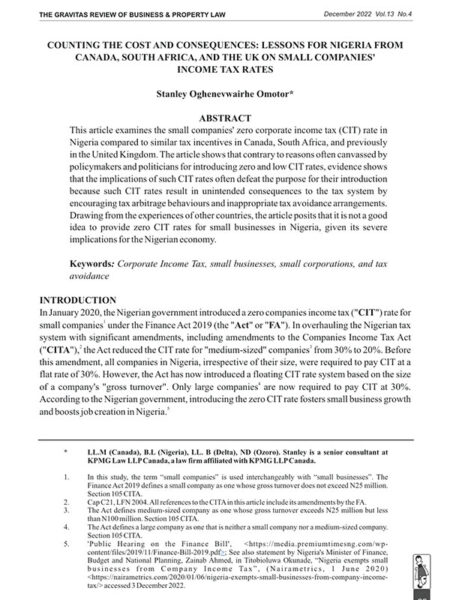
Counting the Cost and Consequences: Lessons for Nigeria from Canada, South Africa, and the UK, on Small Companies’ Income Tax Rates
0₦2,500.00Stanley Omotor, senior consultant at KPMG Law LLP Canada, a law firm affiliated with KPMG LLP Canada, in his article, Counting the Cost and Consequences: Lessons for Nigeria from Canada, South Africa, and the UK, on Small Companies’ Income Tax Rates, examines the small companies zero corporate income tax (CIT) rate in Nigeria, in comparison with similar tax incentives existing in Canada, South Africa, and previously in the United Kingdom. Omotor shows that contrary to reasons often canvassed by policymakers for introducing zero and low CIT rates, evidence shows that the implications of such CIT rates often defeat the purpose for their introduction because such CIT rates result in unintended consequences to the tax system by encouraging tax arbitrage behaviours and inappropriate tax avoidance arrangements. Drawing from the experiences of other countries, Omotor posits that it is not a good idea to provide zero CIT rates for small businesses in Nigeria, given its severe implications for the Nigerian economy.
-
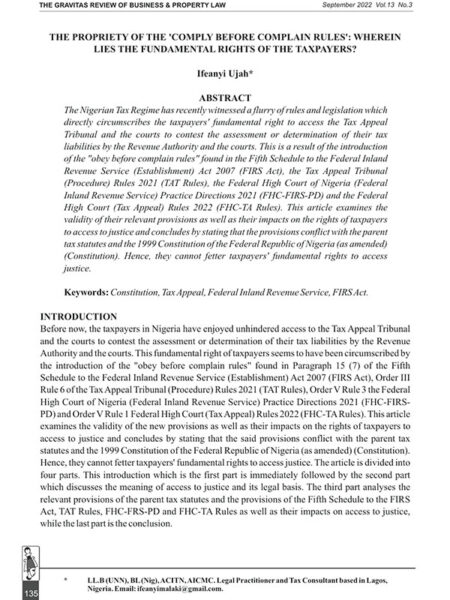
The Propriety of the ‘Comply Before Complain Rules’: Wherein Lies the Fundamental Rights of the Taxpayers?
0₦2,500.00Ifeanyi Ujah, a legal practitioner and tax consultant, in his article, The Propriety of the ‘Comply Before Complain Rules’: Wherein Lies the Fundamental Rights of the Taxpayers? observes that there has recently been a flurry of rules and legislation which directly circumscribes the taxpayers’ fundamental right to access the Tax Appeal Tribunal and the courts to contest the assessment or determination of their tax liabilities. This is a result of the introduction of the “obey before complain rules” found in the Fifth Schedule to the Federal Inland Revenue Service (Establishment) Act 2007 (FIRS Act), the Tax Appeal Tribunal (Procedure) Rules 2021 (TAT Rules), the Federal High Court of Nigeria (Federal Inland Revenue Service) Practice Directions 2021 (FHC-FIRS-PD) and the Federal High Court (Tax Appeal) Rules 2022 (FHC-TA Rules). Ujah examines the validity of these provisions as well as their impact on the rights of taxpayers to access justice.
-
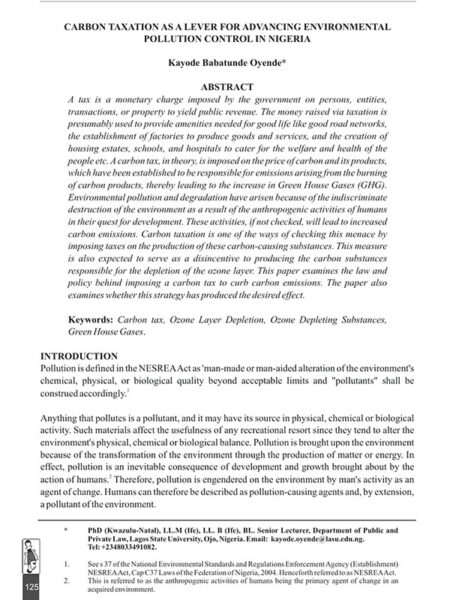
Carbon Taxation as a Lever for Advancing Environmental Pollution Control in Nigeria
0₦2,500.00Dr Kayode Oyende, Senior Lecturer, Department of Public and Private Law, Lagos State University, Nigeria in his article, Carbon Taxation as a Lever for Advancing Environmental Pollution Control in Nigeria, explains that a carbon tax is imposed on the price of carbon and its products, which have been established to be responsible for emissions arising from the burning of carbon products, thereby leading to the increase in Green House Gases. Dr Oyende notes that environmental pollution and degradation have arisen because of the indiscriminate destruction of the environment due to the anthropogenic activities of humans in their quest for development. These activities, if not checked, will lead to increased carbon emissions. Carbon taxation is one of the ways of checking this menace by imposing taxes on the production of these carbon-causing substances.
-
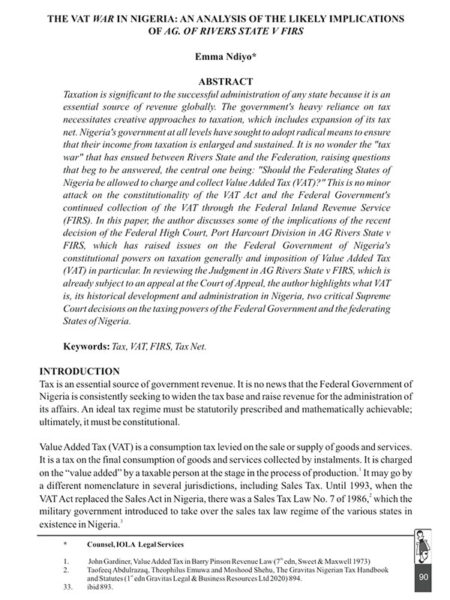
The VAT War in Nigeria: An Analysis of the Likely Implications of AG Rivers State v FIRS
0₦2,500.00Emma Ndiyo, Counsel at IOLA Legal Services, weighs in on the VAT debate in her article, The VAT War in Nigeria: An Analysis of the Likely Implications of AG Rivers State v FIRS. She discusses some of the implications of the recent decision of the Federal High Court in AG Rivers State v FIRS which has raised issues on the Federal Government of Nigeria’s constitutional powers on taxation generally and imposition of Value Added Tax (VAT) in particular. In reviewing AG Rivers State v FIRS, Emma highlights the historical development and administration of VAT in Nigeria. She reviews the Supreme Court decisions in AG Ogun State v Aberuagba and AG Lagos State v Eko Hotels on the taxing powers of the Federal Government and the federating states. She concludes with her thoughts on steps for improved tax administration in the country.
-
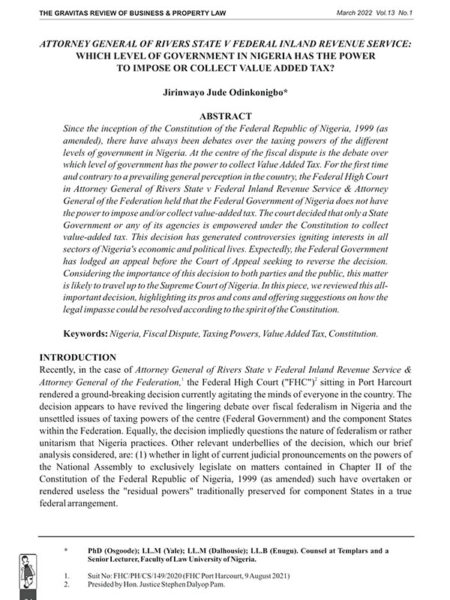
Attorney General of Rivers State v Federal Inland Revenue Service: Which Level of Government in Nigeria Has the Power to Impose or Collect Value Added Tax?
0₦2,500.00Dr Jirinwayo Jude Odinkonigbo of Templars and Faculty of Law University of Nigeria, in his article, Attorney General of Rivers State v Federal Inland Revenue Service: Which Level of Government in Nigeria Has the Power to Impose or Collect Value Added Tax?notes that since the inception of the 1999 Constitution of Nigeria, there have been debates over the taxing powers of the different levels of government, especially with regards to the Value Added Tax (VAT). For the first time and contrary to a prevailing general perception in the country, the Federal High Court in Attorney General of Rivers State v Federal Inland Revenue Service held that the Federal Government does not have the power to impose or collect VAT. The Court decided that only a State Government or its agency is empowered under the Constitution to collect VAT. Dr Odinkonigbo reviews this vital decision, highlighting its pros and cons and offering suggestions on how the legal impasse could be resolved according to the spirit of the Constitution.
-
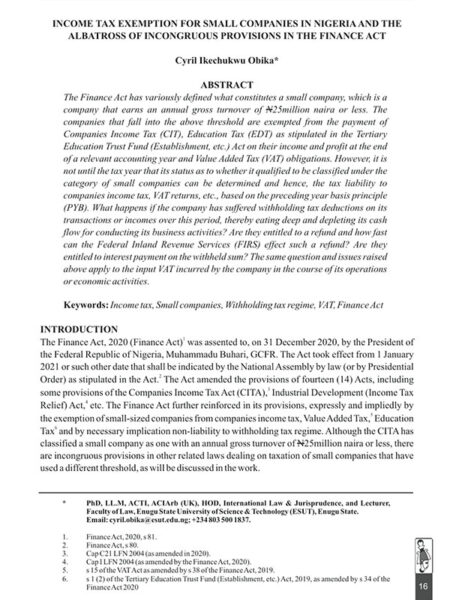
Income Tax Exemption for Small Companies in Nigeria and the Albatross of Incongruous Provisions in The Finance Act
0₦2,500.00Dr Cyril Obika HOD International Law & Jurisprudence, Faculty of Law, Enugu State University of Science & Technology, in his article, Income Tax Exemption for Small Companies in Nigeria and the Albatross of Incongruous Provisions in The Finance Act, examines the provisions of the Finance Act that exempt small companies from the payment of several taxes. He considers the definitions of a ‘small company’ in various tax laws, noting the differences in the threshold to qualification as a small company in these laws. Dr Obika argues that categorising a company as ‘small’ can only be determined at the end of a relevant assessment year and effected in the tax year. He opines that the status of a small company should be presumed for the same company in subsequent years until proven to the contrary that the company has exceeded the threshold set by legislation.
-
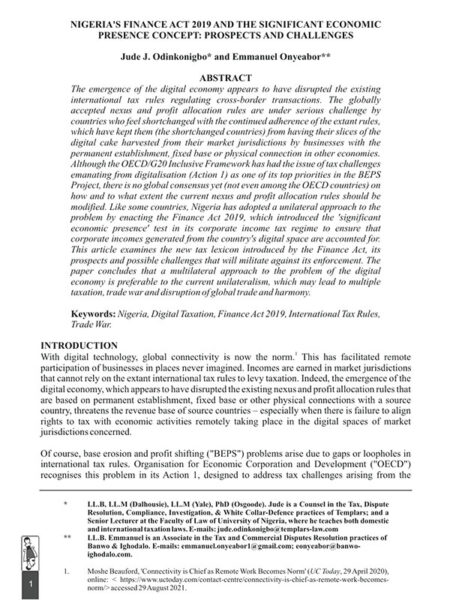
Nigeria’s Finance Act 2019 and the Significant Economic Presence Concept: Prospects and Challenges
0₦2,500.00Dr Jude Odinkonigbo of Templars, and a Senior Lecturer at the Faculty of Law University of Nigeria, and Emmanuel Onyeabor of Banwo & Ighodalo, in their article, Nigeria’s Finance Act 2019 and the Significant Economic Presence Concept: Prospects and Challenges, note that the emergence of the digital economy has significantly disrupted the existing international tax rules regulating cross-border transactions. They examine how Nigeria has tried to solve this problem by enacting the Finance Act 2019, which introduced the ‘significant economic presence’ test, with the objectives of ensuring that corporate incomes generated from Nigeria’s digital space are liable to tax. They note Nigeria’s unilateral adoption of the OECD ‘Significant Economic Presence Test’ on the taxation of Non-Resident Companies (NRCs) in the Finance Act. They consider the prospects and challenges the country might have enforcing the taxation of NRCs operating in the country’s digital space, including the possibility of retaliatory measures by other countries. They conclude with suggestions on how to enforce the provisions of the Finance Act.
-
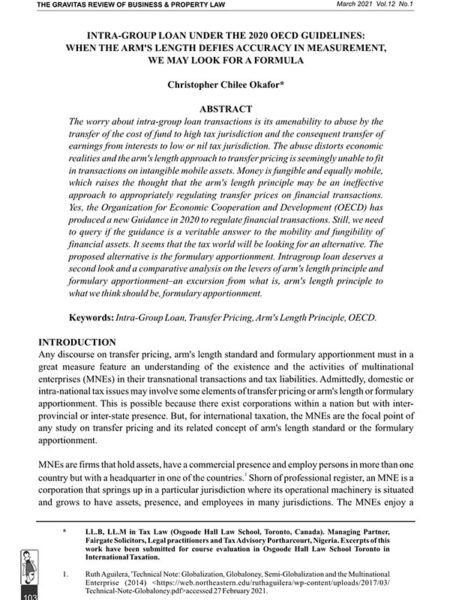
Intra-Group Loan Under the 2020 OECD Guidelines: When the Arm’s Length Defies Accuracy in Measurement, We May Look for a Formula
0₦2,500.00Christopher Okafor, Managing Partner, Fairgate Solicitors, Legal Practitioners and Tax Advisory Port Harcourt, Nigeria, in his article, Intra-Group Loan Under the 2020 OECD Guidelines: When the Arm’s Length Defies Accuracy in Measurement, We May Look for a Formula, argues that the worry about intra-group loan transactions is its amenability to abuse by the transfer of the cost of fund to high tax jurisdiction and the consequent transfer of earnings from interests to low or nil tax jurisdiction. The abuse distorts economic realities, and the arm’s length approach to transfer pricing is seemingly unable to fit in transactions on intangible mobile assets. Though the Organization for Economic Cooperation and Development (OECD) has produced a new Guidance in 2020 to regulate intra-group loan, it is moot whether the guidance is a veritable answer to the mobility and fungibility of financial assets. Christopher proposes an alternative to the arm’s length principle. In his words, intragroup loan deserves a second look and a comparative analysis on the levers of arm’s length principle and formulary apportionment–an excursion from what is, arm’s length principle to what we think should be, formulary apportionment.
-
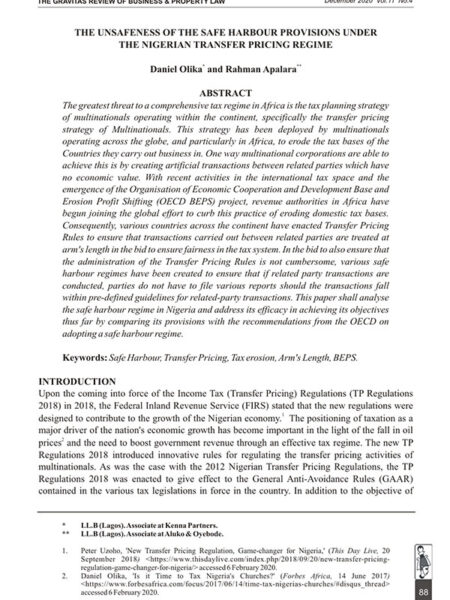
The Unsafeness of the Safe Harbour Provisions Under the Nigerian Transfer Pricing Regime
0₦2,500.00Daniel Olika of Kenna Partners and Rahman Apalara of Aluko & Oyebode in their article, The Unsafeness of the Safe Harbour Provisions Under the Nigerian Transfer Pricing Regime, note that a significant threat to a comprehensive tax regime in Africa is the tax planning, especially transfer pricing, strategy of multinationals. Multinationals have deployed the strategy to erode the tax bases of the countries where they carry out business. One way multinationals do this is by creating artificial transactions between related parties which have no economic value. With the emergence of the Organisation of Economic Cooperation and Development’s Base and Erosion Profit Shifting (OECD BEPS) project, tax authorities across the continent have enacted Transfer Pricing Rules to ensure that transactions carried out between related parties are treated at arm’s length. To ensure that the administration of the Transfer Pricing Rules is not cumbersome, various safe harbour regimes have been created to ensure that if related party transactions are conducted, parties do not have to file various reports should the transactions fall within pre-defined guidelines for related-party transactions. Daniel and Rahman analyse the safe harbour regime in Nigeria by comparing its provisions with the recommendations from the OECD on adopting a safe harbour regime.
-
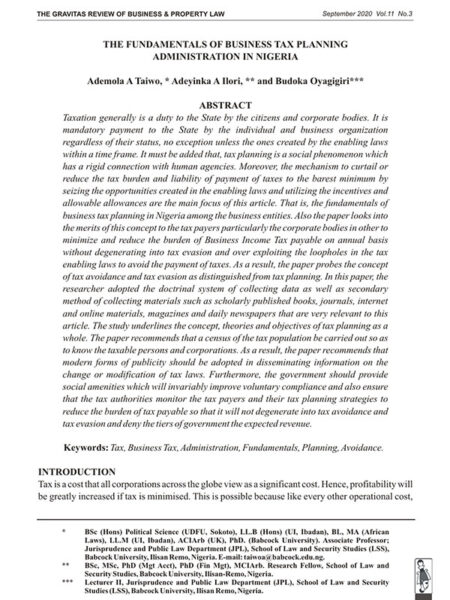
The Fundamentals of Business Tax Planning Administration in Nigeria
0₦2,500.00Dr Ademola Taiwo, Dr Adeyinka Ilori, and Budoka Oyagigiri all of Babcock University Ilisan Remo Nigeria, in their article,The Fundamentals of Business Tax Planning Administration in Nigeria, posit that the mechanisms to curtail or reduce a taxpayer’s burden to the barest minimum by seizing the opportunities created in tax laws and utilizing the incentives and allowances are the main focus of tax planning. Dr Ademola Taiwo et al examine the concepts of tax avoidance, tax evasion and tax planning for business entities. They consider the theories of tax planning and management, the essence of tax management, and forms and incidents of tax planning in the Nigerian tax administration.
-
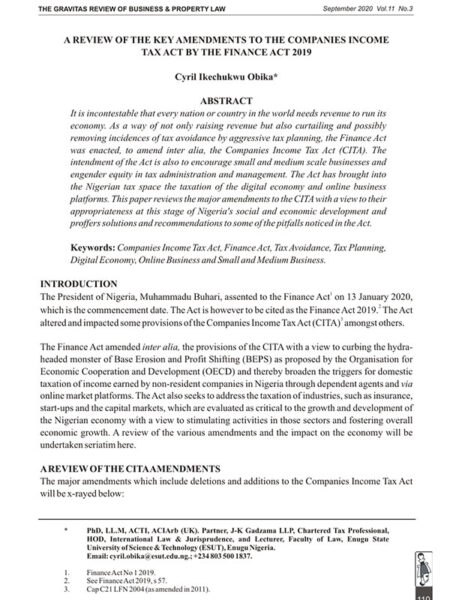
A Review of the Key Amendments to the Companies Income Tax Act by The Finance Act 2019
0₦2,500.00Dr Cyril Obika, Partner J-K Gadzama LLP and Lecturer, Faculty of Law, Enugu State University of Science and Technology (ESUT) Agbani Nigeria, in his article, A Review of the Key Amendments to the Companies Income Tax Act by The Finance Act 2019 examines significant changes to the CITA by the Finance Act including the taxation of the digital economy and online business platforms, formal introduction of the Thin Capitalisation Rule, the removal of total tax exemption on interest, and changes to the Excess Dividend Tax Rule.
-
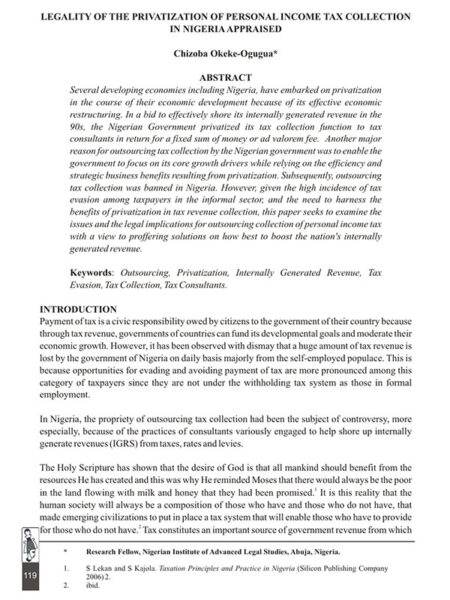
Legality of the Privatization of Personal Income Tax Collection in Nigeria Appraised
0₦2,500.00Chizoba Okeke-Ogugua, Research Fellow at the Nigerian Institute of Advanced Legal Studies Abuja Nigeria in her article, Legality of the Privatization of Personal Income Tax Collection in Nigeria Appraised, argues that though outsourcing of tax collection, which was rampant in the 1990s due to governments bid to shore up internally generated revenue, had been banned, given the high incidence of tax evasion among taxpayers in the informal sector, there are immense benefits in outsourcing tax collection in order to boost government revenue generation aggressively; with a caveat that measures must be implemented to monitor and supervise the activities of tax consultants or collectors.
The Gravitas Review of Business & Property Law



